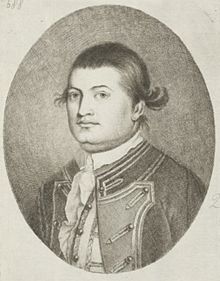Francis Grose
Lieutenant General Francis Grose (* 1758 in Greenland , Middlesex England , † May 8, 1814 in Croydon , Surrey , England) was a British officer and was Lieutenant Governor of New South Wales in Australia .
Life
Early life
Grose was born in Greenland, Middlesex England, the eldest son of the antiquarian Francis Grose and Catherine Jordan. Grose was promoted to ensign in the 52nd Regiment of Foot (infantry) in 1775 and promoted to lieutenant a year later . Grose served during the American Revolutionary War , in which he was wounded in the battle at Fort Montgomery and Monmouth Court House . When he returned to England as a lieutenant in 1779, he worked as a recruiting officer. He rose to the rank of major in 1783 in the 96th Regiment of Foot and in November 1789 he was transferred to the command of the New South Wales Corps and Lieutenant Governor of the Australian colony of New South Wales .
Australia
Grose arrived in Sydney on February 14, 1792 and became a colonial administrator under Governor Arthur Phillip , whose health deteriorated and was granted permission to leave Australia. When Grose took over from Arthur, the population of the New South Wales colony was 4,221, of whom 3,099 were convicts.
After the crop failure of 1793, Grose cut the food rations of convicts but not those of the New South Wales Corps , overriding another fundamental rule by Phillips who had demanded equal rations for all. Furthermore, Phillip had recognized that control over the sale of spirits was all the more necessary in times of crisis because otherwise it would have negative consequences, but Grose made no efforts in this direction and large grievances such as the payment of wages with spirits became common. The officers' practice of trading in liquor took off, and in the meantime, before John Hunter came, the colony developed addiction to drinking and gambling, profligacy and crime, and the officers gained control of the rum trade. How far Grose for this condition is to be blamed cannot be precisely determined. In addition, there were allegations against Grose that he gave guarantees for land to his friends and compliant officers without legal basis, as well as those officers who agreed to his instructions and were loyal to him. The decreased level of morale, the drinking of the population and the status of the colony improved a lot after Grose left for England on December 17, 1794. However, this improvement was not due to size. In all likelihood, the improvement in the situation was the result of better agricultural methods and thus better care for the population after the crisis. Phillip cut the food rations of both the military and convicts to the same extent in times of crisis and distributed the burdens, while Grose did not cut the food rations of the military in times of crisis, he even improved the conditions of his troops to purchase land.
England
After leaving Australia, he held numerous positions in the army. In 1798 he served in Ireland and in 1805 in Gibraltar , where he was promoted to major general. In 1809 he returned to Ireland and rose to the rank of lieutenant general .
Grose's first wife died in January 1813 and in April 1814 he married Elizabeth Driver, the widow of William Paterson . A month later, on May 8, 1814, he died in England.
literature
- BH Fletcher, Grose, Francis (1758? –1814) . In: Australian Dictionary of Biography Vol. 1, Melbourne 1966, pp. 488-489 ( full text ).
Publications
- A treatise on ancient Armor and Weapons . London 1786 ( full text ).
| personal data | |
|---|---|
| SURNAME | Grose, Francis |
| BRIEF DESCRIPTION | British Army Officer and Governor of New South Wales |
| DATE OF BIRTH | 1758 |
| PLACE OF BIRTH | Greenland , Middlesex |
| DATE OF DEATH | May 8, 1814 |
| Place of death | Croydon , Surrey |
